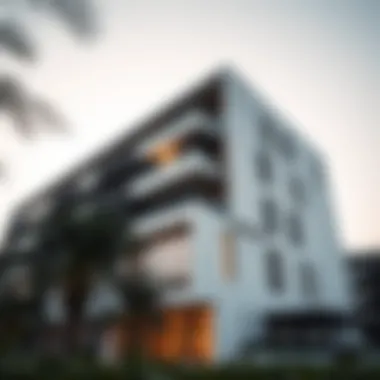Navigating the Dubai Sale Market: Insights and Trends


Intro
Dubai's real estate market is a bustling hub of opportunity, where the skyline is ever-evolving, and new investments lure both seasoned professionals and curious first-timers alike. With its strategic geographic location, it serves as a doorway between East and West, making it a prime destination for property buyers. But before you dive into this dynamic market, understanding the operating environment is crucial. This article digs into the trends, insights, and strategies that define Dubai’s sale market, aiming to equip you with the knowledge needed to make informed decisions.
As the demand for housing continues to fluctuate, various factors influence market performance, making it essential for buyers and investors to stay updated. We will explore trends that shape the market, examine key indicators, and unwrap strategies that serve best for different types of investors. From navigating challenges to seizing opportunities, the goal is to demystify the complexities of Dubai’s vibrant real estate landscape.
Preamble to Dubai's Real Estate Market
Dubai's real estate market is a unique landscape marked by rapid growth and diverse opportunities. For investors, homeowners, and real estate professionals alike, understanding this market is essential. The dynamics of property in Dubai are intricate, influenced by factors ranging from economic trends to emerging buyer demographics. Recognizing these elements allows one to navigate the complexities of property transactions effectively.
Overview of the Market Landscape
The current market in Dubai is characterized by its vibrancy and resilience. Property prices have seen fluctuations, reflecting various factors such as demand-supply dynamics and global economic conditions. New developments are constantly reshaping the skyline, while older properties see revitalization efforts aimed at attracting discerning buyers.
In recent years, there has been a shift towards luxury and high-end residential properties. Developments like Burj Khalifa and Palm Jumeirah stand as testaments to the city's appeal. Yet, despite a focus on opulence, there remains notable interest in affordable housing, catering to a broader spectrum of the population.
The advent of technology has also reshaped the real estate market, with many buyers turning to online platforms for listings and virtual tours. Consequently, understanding both traditional and digital methods of market engagement is crucial for anyone involved in property transactions.
Historical Context
The evolution of Dubai's real estate market can be traced back to the early 2000s when significant changes began to take shape. Initially, the market reveled in government initiatives that allowed foreign ownership, catalyzing a wave of investments. This shift fundamentally altered the composition of the buyer demographic.
As the years rolled on, the market witnessed periods of explosive growth, punctuated by some downturns. The global financial crisis of 2008 serves as a notable example, where property values plummeted, leading to widespread reassessment of investment strategies. Nevertheless, the resultant recovery brought about a renewed confidence, spurring fresh development projects and attracting international investors once more.
The road ahead for Dubai’s real estate market is promising, and understanding its historical context provides invaluable insights into current trends and behaviors. As the market continues to mature, those who are well-informed about its heritage are better equipped to make savvy investment decisions moving forward.
In summary, grasping the importance of Dubai's real estate market is paramount for any stakeholders. It is a constantly evolving arena, driven by innovation, demographic shifts, and a resilient economic backdrop.
Recent Trends in Property Sales
Understanding the recent trends in property sales in Dubai is crucial for anyone involved in the market, be it investors, homeowners, or real estate agents. The sale market in Dubai has shown remarkable dynamism over recent years, influenced by various factors such as global economic conditions, government policies, and demographic shifts. By dissecting these trends, stakeholders can formulate informed strategies and make savvy decisions.
Analysis of Price Movements
Price movements in Dubai's property market have become a focal point for analysts and buyers alike. Over the past several years, prices have fluctuated—sometimes even at dizzying speeds. In the luxury sector, for example, properties like the Burj Khalifa and developments in Dubai Marina have seen a resurgence in values as international buyers, buoyed by competitive mortgage rates and a recovering economy, are more willing to invest in premium real estate. While some now see these properties as not just homes but also as status symbols, the mid-range sector is catching its breath from earlier declines.
Consider the statistics:
- Recent charts indicate a growth rate of roughly 7% in average property prices across popular areas such as Palm Jumeirah and Jumeirah Village Circle.
- New developments have popped up, offering innovative designs that cater to modern lifestyles, which invariably affects the price landscape.
However, it’s essential to approach this data with a discerning eye. The market still grapples with inconsistencies, as certain neighborhoods have clocked price dips while others break records. Buyers should conduct thorough research and possibly consult local real estate experts to navigate these water.
Shift in Buyer Demographics
Another seismic shift in recent trends is the evolving profile of buyers. The characteristics of buyers in Dubai are changing dramatically. Traditionally dominated by expats seeking high-end properties, the market is now welcoming a broader demographic spectrum.
- Younger buyers, particularly millennials and Gen Z, are stepping into the real estate realm. They are keen on sustainability and smart home technology, favoring properties that offer a blend of modern aesthetics and energy efficiency.
- There’s also a marked increase in local Emirati buyers, many of whom are turning to residential properties for investment as well as habitable spaces. This shift represents not just an emotional investment in the community but also a practical approach to securing assets in a rapidly appreciating market.
- Not to mention, digital nomads are becoming a significant faction, brought in by the recent visa schemes that encourage remote work in the UAE. This has led to a rise in demand for short-term rentals and flexible living arrangements.
The changing demographics indicate a more inclusive and diversified market. Keeping abreast of these shifts will not only provide clarity to property sellers and agents but also ensure buyers invest their resources wisely.
"Understanding who is buying what can put real estate professionals ahead of the curve in a competitive landscape."
Understanding these recent trends in property sales equips investors with the knowledge they need to seize opportunities and navigate the challenges that the market might present.
By synthesizing insights into price movements and buyer demographics, it becomes clear how interconnected these factors are in shaping the overall market landscape.


Types of Properties in Demand
In the bustling heart of Dubai’s real estate market, understanding the types of properties that garner the most interest is crucial for any investor, homebuyer, or real estate professional. The demand for property in Dubai is not just about trends; it reflects a confluence of lifestyle choices, economic conditions, and investment opportunities that can significantly impact purchasing decisions. As the city evolves, so do the preferences of its residents and investors. This section delves into two main categories of properties in demand: luxury villas and apartments, as well as affordable housing options.
Luxury Villas and Apartments
Dubai is synonymous with luxury. High-end villas and apartments are often the crown jewels of the property market. These properties typically represent a considerable investment, attracting affluent buyers from various global locales. One can find deluxe amenities such as private pools, state-of-the-art gyms, and breathtaking views of the city skyline. Areas like Palm Jumeirah and Downtown Dubai are particularly sought after due to their prime locations.
The appeal of luxury properties in Dubai extends beyond mere aesthetics. Investors often see luxury real estate as a solid long-term investment. The ongoing development in the area, coupled with the wealthy demographic, allows for consistent demand. Buyers are not merely purchasing a home; they are investing in a lifestyle.
Key aspects to consider about luxury properties include:
- Location: Proximity to leisure and business hubs increases desirability.
- Quality of Construction: High standards are expected, reflecting in higher property values.
- Market Trends: Understanding the nuances of this segment is critical, as luxury markets can vary widely.
According to a recent study, luxury segments are experiencing a resurgence despite economic uncertainties, driven by affluent clients looking for a safe haven for their investments. This paints a picture of a vibrant sector that continues to evolve with each passing year.
Luxury real estate in Dubai is not just an investment in property; it's a statement of success and a lifestyle choice.
Affordable Housing Options
On the flip side of the luxury spectrum lies affordable housing, which is equally critical in addressing the diverse needs of Dubai’s growing population. As the city caters to a wider demographic, the importance of affordable housing options has surged. Properties in this sector are essential for attracting young professionals and starting families seeking a balance between comfort and cost.
Affordable housing developments are often strategically built in up-and-coming neighborhoods, providing essential amenities without breaking the bank. This growing market is predominantly focused on:
- Accessibility: Many affordable options lie in locations that are well connected to public transportation, making commuting easier.
- Modern Amenities: Even at a lower price point, many affordable housing projects incorporate contemporary features that appeal to younger buyers.
- Community Living: These developments are designed with communal spaces, fostering a sense of community among residents.
It’s vital to note that the demand for affordable housing not only serves the populace’s immediate needs but also contributes to the overall stability of the real estate market. As more residents settle in these housing options, they help sustain the economy and encourage future investments.
Through the lens of both luxury and affordable properties, the Dubai sale market showcases a remarkable blend of opportunities and lifestyle preferences. This dynamic market ensures that regardless of financial standing, individuals can find a place that suits their needs while contributing to the vibrant fabric of this remarkable city.
Investment Strategies in Dubai
Investing in real estate in Dubai is not just about finding a property; it’s about selecting a strategy that aligns with your financial goals and market conditions. In the bustling environment of Dubai's sale market, where the competition is fierce, having a sound investment strategy can make or break a property endeavor. This section aims to shed light on different strategies, weighing the pros and cons, and helping investors navigate potential pitfalls.
Long-term versus Short-term Investments
When considering how to invest in Dubai's real estate, one must address the critical distinction between long-term and short-term investments. Each approach comes with its own set of benefits and challenges, and understanding these can guide investors toward better decision-making.
Long-term investments typically involve purchasing properties intended to hold for several years, capitalizing on property appreciation. Investors often look for areas with increasing infrastructure development, like Dubai South or Mohammed Bin Rashid City. The economic climate, interest rates, and population growth can play crucial roles in the appreciation rates of these assets. Moreover, long-term investments might generate a steady rental income, especially in prime locations.
On the flip side, short-term investments—often referred to as flipping—focus on quick purchases and sales, aiming to capitalize on market fluctuations. This requires a keen eye for undervalued properties that can be renovated and sold at a profit within months. Investors jumping into this strategy should be wary of market volatility; a sudden downturn can drastically affect their profit margins. Also, financial liquidity is crucial here, as unforeseen expenses can lead to heavy losses.
In summary, while long-term investments provide stability and potential for significant returns, short-term strategies demand agility and aggressive market participation. Both necessitate diligent research and a comprehensive understanding of the local market dynamics.
Opportunities in Off-Plan Properties
Off-plan properties present a unique opportunity in Dubai’s real estate landscape. These are properties that are sold before construction is completed, allowing investors to purchase at lower prices compared to ready-to-move options. This can be especially attractive in developing areas where the growth potential is evident.
Investing in off-plan properties can be advantageous for several reasons:
- Lower Prices: Typically sold at a price lower than similar completed properties, making them appealing to both end-users and investors.
- Flexible Payment Plans: Many developers offer staggered payment options during the construction phase, which eases cash flow management for buyers.
- Design Choices: Buyers often have a voice in layout and design, which can enhance the property’s appeal upon completion.
- High Rental Yields: Once completed, these properties can offer good returns, particularly if situated in sought-after neighborhoods.
However, potential buyers should tread carefully, as purchasing off-plan properties can come with risks, including project delays, changes in the market, or even financial difficulties faced by developers. Thus, conducting thorough due diligence—reviewing the developer's past projects and current financial status—is vital before making a decision.
Understanding the Legal Framework


Understanding the legal framework governing property sales in Dubai is as critical as knowing the landscape itself. This framework provides the guidelines necessary for compliant transactions, thereby protecting all parties involved from potential pitfalls. As the Dubai property market continues to flourish, familiarity with these legalities reflects a strategic edge for buyers, sellers, and investors alike.
Regulations Governing Property Sales
The regulatory landscape in Dubai’s real estate sector is intertwined with both local laws and international standards. The Real Estate Regulatory Agency (RERA), part of the Dubai Land Department, is primarily responsible for overseeing property transactions, ensuring transparency and fairness in the market.
One of the key regulations includes the requirement for property developers to obtain a sales or purchase contract before a transaction can proceed. This contract must detail
- Property specifications: Size, location, and amenities
- Payment terms: Amounts, due dates, and penalties for non-payment
- Ownership rights: Title deed registration process and transfer fees.
Additionally, developers are obligated to maintain a trust account for buyers' deposits, providing an essential layer of security. This measure safeguards against any financial mismanagement, which, though rare, can still occur in a booming market.
It's also worth noting that foreign investors are permitted to own property in designated areas known as freehold zones. Here, properties can be bought, sold, and leased with more liberal terms compared to traditional leasehold arrangements that assign property use for a certain period while keeping ownership within local entities.
"Navigating property laws might seem daunting, but being informed keeps you one step ahead of the game."
Key Considerations for Foreign Investors
Foreign investors looking to dip their toes into Dubai’s real estate pool must pay careful attention to specific legal considerations. Firstly, it’s vital to understand the areas available for foreign ownership. While the luxurious Burj Khalifa vicinity or the scenic Palm Jumeirah shines with investment potential, not all locations are open to non-UAE citizens.
Other key points include:
- Financing options: Foreigners sometimes face different financing terms than locals, including higher interest rates or lower loan-to-value ratios. Knowing the local banking policies can make a significant difference when securing a mortgage.
- Tax regulations: Dubai is known for its absence of property taxes and low fees. However, understanding any potential tax liabilities in your home country regarding foreign investments is crucial.
- Legal documentation: Essential documents such as a passport copy, proof of income, and bank statements are required for purchasing property. Missing any of these can delay the process significantly.
The Role of Real Estate Agents
In the intricately woven tapestry of Dubai’s real estate market, real estate agents serve as the threads that connect various parties—buyers, sellers, and investors. Their importance cannot be overstated. Agents provide not just transactional facilitation, but also serve as insightful navigators of the often-fraught market landscape. With an understanding of local nuances, they can pinpoint opportunities and potential pitfalls that may slip by an untrained eye. Behind every successful property sale is a competent agent steering the ship, ensuring smoother sailing for all involved.
The role of these professionals extends beyond simple property listings. They are invaluable in conducting market analysis, understanding property values, and providing data-driven guidance in a fast-paced environment like Dubai. Thus, their role is critical for informed decision-making and strategic planning, especially for investors looking to maximize their returns in this competitive space.
As the saying goes, "You get what you pay for"; choosing wisely when it comes to an agent can have lasting implications for your investment journey.
Choosing the Right Agent
Selecting the right real estate agent is not just a matter of luck. It’s akin to fitting a puzzle piece into a larger picture; the right connection can bring clarity and coherence to your property search. Here are several essential factors to consider:
- Experience and Expertise: Look for agents who have a solid track record in the Dubai market. Their familiarity with neighborhoods and property types can guide you toward the best investments.
- Client Reviews: Word of mouth is powerful. Seek testimonials from previous clients to gauge an agent's reliability and effectiveness. Checking websites like Facebook or local reealtor forums can provide insights.
- Communication Style: An agent's ability to communicate clearly and effectively is paramount. You need someone who is responsive and approachable, as this can be indicative of how they will handle negotiations on your behalf.
- Professional Networks: A well-connected agent often has access to off-market listings and insider information that can give you an edge.
- Transparency: Finally, ensure that the agent is open about their fees and commission structure. Hidden agendas can create distrust and complicate the buying or selling process.
In a nutshell, when choosing your agent, think of it as a marriage of sorts; you could be working closely for an extended period. Therefore, go for someone whose vision aligns with yours.
Agent Fees and Commitments
The financial aspect of hiring a real estate agent warrants serious consideration. While their services come at a cost, understanding fee structures can save you from unexpected surprises down the line.
Most agents in Dubai operate on a commission basis, which typically ranges between 2% to 5% of the property's selling price; this can depend on the specific terms negotiated. Though that may seem steep, remember that their expertise can often lead to higher offers and streamlined processes, ultimately offsetting that expense.
However, some agencies may also charge a flat fee or offer different models of engagement based on your needs.
When engaging with an agent, it’s crucial to clarify:
- Commitments: What services are included in their fees? From property viewings to negotiations, understanding the full scope of what you’re paying for is essential.
- Exclusivity Agreements: Some agents may require you to sign contracts that give them exclusive rights to represent you. Make sure to read the fine print and confirm how this aligns with your goals.
- Additional Costs: Questions about any supplementary fees for marketing or listing in premium listings should be addressed upfront to avoid unpleasant surprises later on.
Establishing a clear and mutually beneficial relationship with your agent can greatly enhance your experience in the Dubai real estate market. Informed decisions lead to greater satisfaction, whether you are buying or selling.
Challenges in the Sale Process


Navigating the sale process in Dubai's real estate market is akin to steering a ship through both calm and stormy seas. While opportunities abound, challenges lurk beneath the surface that can impede the journey for investors, homeowners, and real estate professionals alike. Understanding these obstacles is vital for anyone looking to make a successful property transaction in this vibrant landscape.
Market Volatility
Dubai's property market is characterized by remarkable fluctuations. Prices can swing wildly based on various factors—from shifts in global economic conditions to local market demands. For instance, during times of economic growth, one might see property values soar, enticing investors into the fray. However, a sudden downturn, perhaps triggered by global market jitters, can lead to swift declines in property prices.
This volatility poses a significant risk, especially for those with a short-term investment horizon. In other words, an investment made during a boom might quickly find itself underwater if market conditions change abruptly.
To navigate this volatility, it is critical for buyers to:
- Conduct thorough market research: Understanding past sales trends can offer insights into where the market might be heading. Websites like Property Finder often provide historical data.
- Stay updated on economic indicators: Monitoring global and local economic news can help gauge potential market movements. Resources, such as Dubai Statistics Center, can provide real-time data on economic performance.
In essence, having a finger on the pulse of market dynamics allows buyers to make strategic decisions and avoid pitfalls associated with rapid fluctuations.
Financing Hurdles
Financing a property purchase in Dubai can be a complicated affair. While many lenders are eager to finance real estate, the terms can be daunting. High-interest rates, upfront costs, and stringent loan requirements can create considerable barriers for potential buyers. Moreover, lenders often require a hefty down payment, which can be a shock to first-time investors.
It's also crucial to remember that the financing landscape can differ dramatically for locals versus foreigners. For instance:
- Local buyers might find more favorable terms, including lower interest rates and lenient eligibility criteria.
- Foreigners, on the other hand, could face stricter limits on the amount they can borrow, depending on their residency status.
Those considering financing options should:
- Consult with mortgage advisors: Navigating the financing maze on your own can be confusing. A good advisor who understands the local market can provide invaluable insights.
- Evaluate different loan products: Rates can vary widely among lenders; taking the time to compare options can save significant money over the life of the loan.
As seen, tackling these challenges thoughtfully not only increases the odds of a successful transaction but also enhances one's overall understanding of Dubai's dynamic real estate landscape. Investors who prepare for both market volatility and financing hurdles will be positioned better to seize opportunities in this ever-evolving market.
Future Outlook of the Dubai Sale Market
The future of Dubai’s sale market is poised for dramatic shifts that could reshape the landscape dramatically. Understanding this is crucial for investors, homeowners, realtors, and analysts alike. The next wave of growth hinges not only on local dynamics but also on international influences. Thus, having a pulse on these elements opens doors for strategic investments and smart decisions.
Predicted Growth Areas
When discussing growth areas, it’s vital to pinpoint which regions in Dubai are likely to flourish in the coming years. Here are some hotspots:
- Dubai Marina and Jumeirah Beach Residence: Known for their luxurious waterfront developments, these areas continue to draw high-profile investors. With new entertainment facilities springing up, they present a golden opportunity for residential and commercial investments.
- Downtown Dubai: The heart of the city offers a unique blend of attractions. As it develops further, this area attracts not just residents but also businesses. Investment opportunities here are akin to striking gold.
- Dubai Creek Harbour: A relatively newer area, it embodies modernity and nature. With the construction of the Dubai Creek Tower, it’s set to challenge even the Burj Khalifa in iconic status. Development plans are robust, fostering a fertile ground for real estate growth.
- Dubai South: This region is tied to the Expo 2020 legacy, aiming to cater to the future needs of residents and businesses. If you’re looking to invest in affordable housing options or logistics, this is the path to consider.
It’s clear these areas are not just drawing attention but promise exciting avenues for returns on investments. By aligning one’s portfolio with these predicted growth areas, investors might position themselves favorably.
Impact of Global Economic Factors
Global economic shifts have a substantial impact on local markets. For Dubai, these can be particularly pronounced given its positioning as an international hub. Factors to consider include:
- Oil Prices: Changes in oil prices often ripple through Dubai's economy, affecting spending power. The region traditionally relies on oil, so a downward trend could sour buyer sentiment.
- Currency Fluctuations: The UAE Dirham's peg to the US Dollar means fluctuations in the latter can significantly impact purchasing power for foreign buyers, thereby affecting market dynamics.
- Geopolitical Stability: The broader state of global affairs can either attract or deter investment in Dubai. Political tensions elsewhere can often lead investors to seek a safe haven, boosting the local market. Conversely, instability can lead to cautious buyer behavior.
- International Trade Policies: Tariffs and agreements can also influence foreign investments. Any changes that make it easier or harder for international buyers can directly sway the property sales market.
More than ever, understanding these factors is key to making informed decisions. Successfully navigating these challenges involves keeping an eye on macroeconomic indicators as they can shift the market overnight.
"In real estate, the world is connected. What happens globally doesn’t stay out of the local conversation."
In summary, the outlook for the Dubai sale market is dynamic and layered with opportunities stemming from identified growth areas and external economic factors. For those positioned correctly, this can easily translate into significant advantages.
Culmination
In this exploration of Dubai's real estate market, the conclusion serves as a vital summary of insights, urging investors and buyers to distill the plethora of information presented throughout the article. Understanding the nuances of the sale market in Dubai is no small feat, considering the rapidly shifting landscape influenced by economic trends and demographics.
Key Takeaways for Investors and Buyers
When contemplating a purchase or investment in Dubai's property market, several essential considerations come to the fore:
- Market Dynamics: Recognizing the cyclical nature of property sales can guide one in making timely decisions. Seasonal trends often determine when to invest or sell, as market interest can fluctuate significantly from quarter to quarter.
- Understanding Buyer Preferences: Different demographics exhibit varying preferences. Luxury villas may appeal to high-net-worth individuals, while young professionals might lean towards affordable apartments. Tailoring property offerings to meet these needs remains crucial.
- Legal Nuances: A firm grasp of the regulations governing property ownership—especially as a foreigner—is fundamental. Investors must navigate through the legal framework carefully to avoid pitfalls.
- Engage Professional Help: The role of real estate agents is paramount. They not only assist in navigating market complexities but also provide valuable insights into pricing and local demand.
- Global Economic Context: The sales market is susceptible to broader economic factors. Keeping an eye on global trends, such as interest rates or geopolitical shifts, can significantly influence local investment viability.
Ultimately, the essence of successfully navigating the Dubai sale market ties back to being informed. Whether one is looking to invest actively or purchase a dream home, synthesizing data presented in this article can lead to informed decisions, minimizing risks and enhancing potential returns. The dynamic nature of Dubai's real estate offers both challenges and opportunities for those willing to delve deeper into the intricacies of the market.







